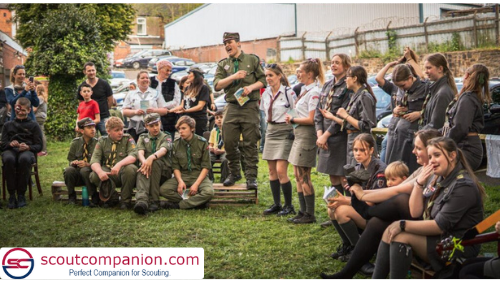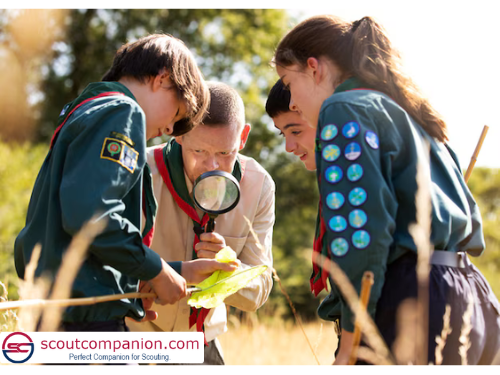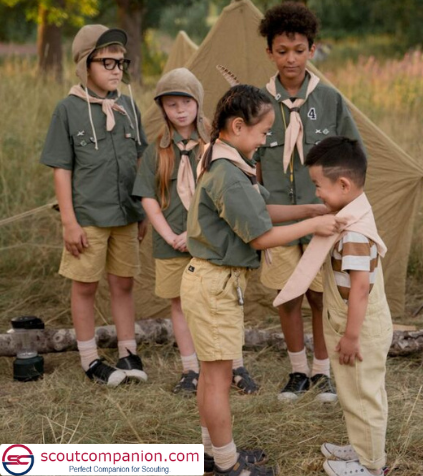“True leaders don’t create followers; They create more leaders”
Leadership refers to the act of leading or guiding people, groups, or organizations toward a common goal. Each scouts develop leadership skills in scouting that enhances their personalities in their personal and professional lives, and Scouting mainly focuses on leadership. Scouts gain essential skills on their journey, as highlighted in our post on 10 Essential Skills. This guide specifically covers five leadership skills scouts learn every day.

Table of Contents
Following are the 5 leadership skills scouts learn everyday in scouting:
- Cooperation
- Communication
- Proper planning
- Problem-solving
- Trustworthiness
1. Leadership Skills Scouts Develop: Cooperation
“Coming together is a beginning. Keeping together is progress. Working together is a success” – Henry Ford
Scouting helps build leadership skills scouts can carry throughout their lives, both personally and professionally. A leader is always created only when there is a group to lead. The group leads to teamwork where the skill of cooperation comes in. While working as a group scouts learn the skill of cooperation and the impact the act of cooperation can make in the path towards success.

Activities like outdoor games, hiking, hunting, shelter building, navigating, etc will help scouts develop this cooperative skill. The leader should know how to manage each scout and make them more involved in working together by motivating them.
By learning leadership skills scouts also develop qualities like,
- Communication skills
- Flexibility
- Support
- Delegation
- Emotional intelligence
Learning cooperation skills also brings out their nature of helping others and serving the community. When working as a team they can better understand the strengths and weaknesses of other scouts so that they can assign work according to their capacity.
2. Communication
“The art of communication is the language of leadership” – James Humes
From leadership skills scouts develop effective listening and speaking skills are essential for every leader. Mastering these skills is non-negotiable for successful leadership. As the scout groups follow the leader’s instructions, it is very important to make the commands clear as a leader.

Good communication enables leaders to articulate their vision clearly, inspiring scouts to get involved with enthusiasm. Apart from scouting, communicative skills will help an individual even in their workplace as an adult.
Apart from teamwork, group training, and challenging activities, communication plays a vital role in the sharing and exchange of information, knowledge, and previous experience. The scout leaders also learn how to teach a skill in a short but effective way to the scout team.
By developing communication one can also develop the self-confidence needed for stage speech, presenting, or sharing an idea in a meeting. This also makes them more comfortable in social situations and makes them speak up for themselves or for others in times of need.
As we know communication is not only about speaking, but also about listening, scouts leaders are also trained to listen to their scout team for feedback and opinions while making decisions.
3. Proper Planning
“Proper planning increases your chances of being successful”
A well-planned task is a halfway success. When going for team activities like navigation, and shelter building, scouts will plan things starting from preparing the equipment, organizing them, and implementing the plans that they have sketched.

Plans won’t always work as expected. Sometimes there may be failures in the plan. But the leader should be ready with plan B. The leader should tackle the situation and bring it under control with his/her intelligence for planning.
Problem-solving also copes with time management. By learning this skill the scouts will develop the ability to solve the problems that arise while serving a community in times of emergency and also can save lives by reacting quickly to situations that need medical assistance.
Following are some of the qualities that scouts learn along with problem-solving:
- Critical thinking
- Decision-making
- Adaptability and flexibility
- Responsibility
- Analytical thinking
- Risk management
4. Problem-solving
“The best way to escape from a problem is to face it and solve it”
The primary goal of problem-solving in scouting is to empower young scouts to cultivate their critical thinking skills, particularly when faced with pressure. This invaluable ability not only enhances their decision-making but also prepares them for real-life challenges. This will make them focus more on the solution rather than worrying about the problem as an adult.

Activities like cooking meals, using maps and compasses for navigation, and using a first aid kit to treat minor injuries are life-long skills that improve their perspective of looking at a problem in a different way.
The scouts also learn the way of solving the problem. They include:
- Identifying the problem.
- Finding multiple ways to solve the problem.
- Forethinking the consequences of the solutions.
- Choosing the optimal solution that has fewer negative consequences.
- Implementing the chosen solution to solve the problem.
By learning the above key hints the scouts can easily short out the problem effectively. These ways of solving the problems will also help them in their adult life and workspace.
5. Trustworthiness
“Leadership is built on trust”

As scouting emphasises the Scout Oath and Law, which stresses principles like integrity, respect, and service to others, scouts learn to keep their promises to their scout team. They also learn how to act with integrity with activities they do. The entire scout will depend on the scout leader for all the group activities.
Apart from teamwork, scouting teaches scouts to build strong friendly relationships with other scouts and accountability. The trustworthiness that scouts learn in scouting also shapes their personalities in private life including personal relations with other people. Trustworthiness also helps scouts to become good citizens who will serve their country and community.
When the scouts learn to be trustworthy, they in turn take responsibility and accountability for the actions and decisions they make. Trustworthiness naturally promotes respect. When other scouts learn to respect the leader, by nature the leader will respect his/her leadership position and his commitment toward the team.
For more on the importance of teamwork in leadership, you can read this article on developing teamwork and leadership skills.
Conclusion
The leadership skills scouts acquire through practical ways of learning things through scouting will last forever as a lesson in the minds of the scouts even when they grow into adults. The skills they learn not only help them to survive in scouting troops but also empower the personal, academic, and professional parts of their lives.



